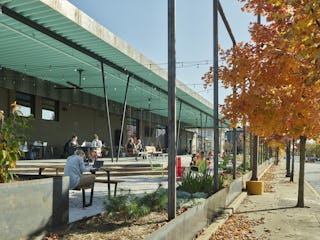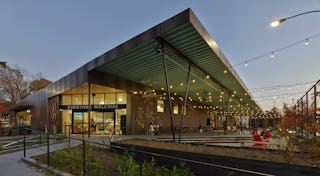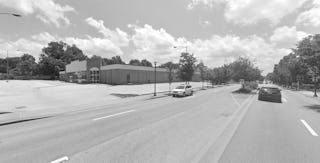thinking outside the (big) box.
Jun 27, 2022

HOW RENOVATIONS AND CRAFTED OUTDOOR SPACE REVITALIZE URBAN SPACES
By Chris M. Baribeau
(Originally published in Block, Street & Building, a special publication of the Arkansas Times)
It is fair to say that big box buildings are the American architectural blight of the second half of the 20th century. While an increasingly automobile-centric society needed more expansive places to store goods for a growing population, the big box is less of a store in a traditional human scale and more of a warehouse for direct transactional purposes.
Architecturally, these boxes are an expression of little more than pure function. This may have suited the American psyche for decades, but post-pandemic (and pre- for that matter), there is an increased desire for more authentic, in-person experiences and transactions. This shift informs design requirements in the world we are building today.

Big box stores are closing at a record pace, and their “bones” are nothing like those of a downtown, load-bearing masonry building tied so instinctively to the charm and nostalgia of long ago. Often, these big boxes are designed for a 20- to 30-year lifespan, and the large empty volumes are resource hogs in the worst sense. What is now clear from the booming development of big box culture is that these buildings were not conceived with the community’s best interest in mind. The proverbial seas of asphalt create stark, placeless voids in our communities, especially when businesses are no longer operational.
So why should we care?
Our built environment is a direct reflection of our culture’s values. As we travel across the heartland’s many states of placeless suburbia, the self-evident truth is that we are currently not doing a great job. But we can do better, block by block.
DOING BETTER
In Fayetteville there stood a big, dumb box — formerly home to an International Grocers Alliance (IGA) store — located at the contextual intersection of a bustling downtown, a historic residential neighborhood and the University of Arkansas campus. A generally unattractive building, it was not aging well and, characteristic of the big box model, had no distinctive or inviting architectural features. The footprint was conceived within automobile-focused zoning and burned into the mind of the community as a missing tooth along the College Avenue corridor, nothing more than an unfortunate row of parking spaces set against a completely blank beige brick wall. Placeless. Void.
Despite all of this, our progressive client, Ozark Natural Foods Co-op, and our design team at Modus Studio saw potential to reposition this building in the hearts and minds of the community. From big box to co-op, we began to reinvent the experience of the building, transforming it into a real place within the fabric of Fayetteville.
Our first big move was to remove the dated entrance vestibule that shoppers had been awkwardly navigating for decades. You know the one — that clumsy double-door zone that’s haphazardly filled with mismatched goods and overflow merchandise designed to alert consumers to a good deal.
We relocated the main entrance to the corner, entering under a warm plane of Arkansas-sourced pine and constellation lighting, where visitors are reminded that “Everyone Welcome” is the mantra of real community. This new corner approach is also part of a larger transformation, creating Fayetteville’s largest front porch.

Counter to preconceived notions of big box stores directing activity toward the parking lot, we opened up the previously blank western wall, adding a 25-foot-deep canopy for dining, lounging and socializing all along the active four lanes of College Avenue traffic. Softened by native landscaping and edible plantings, steel planters and varied hardscapes buffer the traffic and carve out multiple scalable spaces for use by casual patrons and organized events hosted by the co-op. The direct connection to indoor dining, via a coffee bar and taproom serving up local grinds and brew, invigorates the 117-foot-long facade and is a beacon of community presence and interaction.
We were delighted by the opportunity to reuse this building, to breathe new life into an abandoned box. At Modus Studio, we know that sustainability is achieved by delivering projects that are truly embraced by those who use them. Adaptive reuse of existing buildings is often the first step in that process. Now, the box is alive and well, repositioned in a naturally weathering steel shell that speaks to the organic nature of the products within. A new landscape is woven into the existing parking areas, solving decades of hydrological problems, including polluted stormwater runoff that spilled directly onto College Avenue. All new high-efficiency mechanical systems, tubular skylights for natural daylighting and durable, low-maintenance finishes inside and out clearly identify the co-op as a community hub in a location that was once a food desert in the heart of the city.
In this reimagined place, long-term co-op members now mingle with younger university students. The urbanism is inviting and energetic, with multiple modes of transportation converging at the busy intersection and ultimately at the front porch. Pedestrians and cyclists are as abundant as vehicles, and this former big box typology is now a catalyst simultaneously serving the needs of the individual shopper and the community as a whole. The size of the building did not change, but the big box mentality has been eradicated via a scale of user-friendly space and thoughtful design revisions.
The city of Fayetteville has been leading a purposeful effort to fix the College Avenue corridor, attempting to rectify the unfortunate results of poor zoning decisions of decades past. The Ozark Natural Foods Co-op is a catalyst project in this vein, proving that good, thoughtful design aligned with the co-op’s mission to bring the community and quality local farms and food together can, in fact, be a collective urban endeavor.
In our journey at Modus Studio, we are driven to create built environments that challenge convention and elevate the human experience. We posit that the co-op does exactly that. See you on the porch.
Chris M. Baribeau, AIA, is a principal architect at Modus Studio.